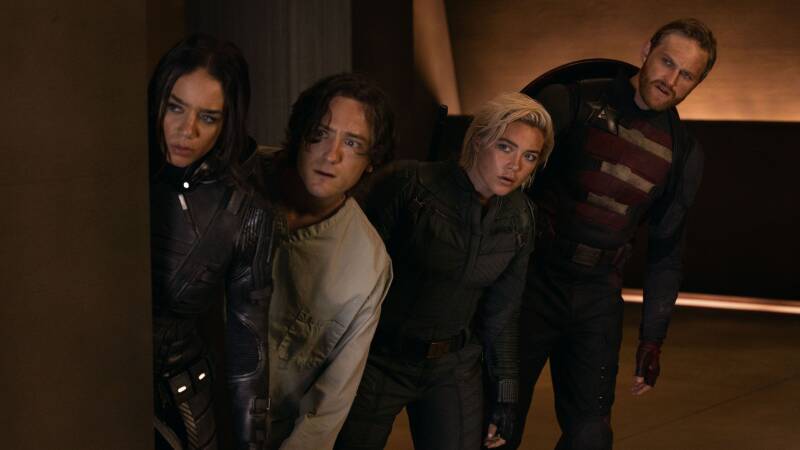
For a studio synonymous with spectacle, Thunderbolts* is an anomaly—and, paradoxically, one of its finest achievements. It is neither galaxy-spanning nor multiverse-breaking. There are no portals, no sky lasers, no races to retrieve glowing MacGuffins. Instead, Marvel’s latest swings the pendulum back towards something it seemed to have forgotten: people. Not pawns in a CGI chess game, but messy, wounded, quietly hopeful people trying to make peace with their pasts. And that shift, that defiant act of restraint, is what elevates Thunderbolts* from franchise filler to a genuinely affecting piece of cinema.
There is, of course, a plot. But what lingers isn’t the mission; it’s the ache. Florence Pugh’s Yelena Belova is the soul of the film, inhabiting a role that could’ve been jaded or performative, and instead turning in something disarmingly raw. Haunted by loss and quietly self-destructive, she bristles at the idea of team cohesion but can't help forming tenuous bonds with the very people she mocks. Pugh doesn’t chew scenery—she glances past it, sighs through it, leans into silence. The camera, wisely, follows.
Sebastian Stan’s Bucky Barnes is dialed down, internalised. This isn’t the stoic Avenger on a redemption arc—it’s a man treading water, pulled under by ghosts that refuse to dissipate. His chemistry with Yelena, laced with dry humour and mutual exhaustion, is subtle and lived-in. They are not trying to save the world. They’re trying to save themselves. Even Wyatt Russell’s John Walker, once a villainously patriotic avatar of American aggression, is shaded in more deeply, softened not by exposition but by hesitation. You sense the damage in him before it’s ever named. David Harbour’s Alexei Shostakov brings a burst of chaotic warmth to the film—a big man with an even bigger heart, desperate for connection after months in isolation. He’s like a restless kid finally let outside, crashing into reunions with a mix of clumsy affection and loud bravado. But beneath the jokes and bluster is a man who just wants to feel needed again, and Harbour plays that longing with disarming sincerity.
But the standout is Lewis Pullman as the Sentry—Marvel’s most psychologically layered character since Wanda Maximoff. His portrayal of Bob Reynolds is delicate and unnerving: a man split down the middle, plagued by guilt and mentally unraveling. The “Void” is less an antagonist and more a mirror—reflecting the film’s deeper concern with depression, dissociation, and the silent terror of becoming unrecognisable to yourself. Pullman doesn’t play it like a superhero. He plays it like someone quietly pleading for mercy from his own mind.
None of this would have worked if the film had defaulted to the usual Marvelisms. But director Jake Schreier steers with a different compass. His background in intimate, human-scale storytelling—most notably the Netflix series Beef—is all over this. The camera lingers just a little longer on hands, on breath, on the tension in a character’s shoulders. Action is present, but never dominant. A brutal one-take corridor fight nods to genre expectation but immediately undercuts it with emotional fallout. CGI, though used effectively when necessary, never hijacks the tone. The destruction stays small, personal. Buildings don’t fall. People do.
It’s tempting to call this Marvel’s answer to The Suicide Squad, but that misses the point. Thunderbolts* is not anarchic or cynical—it’s mournful, often tender, and entirely sincere. It doesn’t mock its characters or use trauma as punchline. It lets them break. It lets them fail. And slowly, gently, it lets them rebuild.
The film also benefits from its structural simplicity. There's no multiversal entanglement, no obligatory Phase Six setup scene tacked to the end like a corporate memo. The stakes are emotional, not existential. It’s about whether these damaged people can form something close to a family, or at least a functioning alliance. And for once, Marvel has the courage to leave that question open, unresolved. There is catharsis, but not closure.
Much of this success stems from Marvel taking a risk on a filmmaker who isn't just passing through for the paycheck. Jake Schreier’s vision is cohesive, character-focused, and surprisingly intimate for a studio so often preoccupied with scale. His eye never wanders from the emotional throughline, and his care for these characters is palpable. That care is infectious. Audiences aren’t asked to cheer for the team. They’re invited to feel for them. The film earns that feeling, slowly, without manipulation or melodrama.
In a cinematic universe long burdened by bloat, Thunderbolts*is a revelation. It’s what happens when the machinery of a blockbuster is used to tell a human story, not smother one. It’s what happens when Marvel stops trying to top itself and instead remembers why we cared in the first place.
It may not be the loudest or most explosive film the MCU has delivered, but it just might be the most honest.
8/10
Add comment
Comments